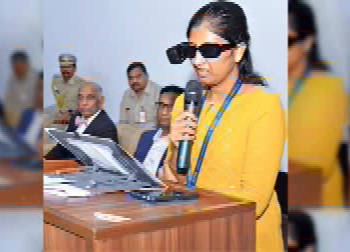With the help of AI glasses made by KIMS Foundation, the lives of disabled people will change…
Hyderabad: At a time when technology is constantly redefining the boundaries of what is possible, AI-powered smart glasses are bringing new hope to the visually impaired. These innovative glasses, developed by KIMS Foundation and Research Center (KFRC), are set to change the lives of approximately two crore blind people in India. Telangana Governor Jishnu Dev Varma unveiled these glasses at a distribution program in Secunderabad. During this, he said, “These AI-powered smart glasses will bring new light in the lives of visually impaired persons and give them hope for a brighter future.” AI-powered glasses developed under the leadership of Dr. Bollineni Bhaskar Rao, CMD of KIMS Hospital, will transform the lives of visually impaired persons. The purpose of glasses is to increase the independence and mobility of visually impaired individuals.
The glasses have several revolutionary features that can change the way visually impaired people navigate the world around them. During the distribution programme, Dr Rao also emphasized that these glasses will significantly boost the self-confidence of visually impaired persons. , So that they will be able to do their daily work comfortably with ease and dignity. He said, “The technology used in these glasses will help in improving life and providing more independence to the blind community.” In the initial phase, these glasses were given free of cost to 100 people. Those who received the glasses were also given training to use them. The training was designed to help users fully understand how to use the glasses effectively and integrate them into their daily routine.
Features of Smart GlassesMany features have been included in AI-powered glasses to help visually impaired people. The most important among these features is face recognition. A special feature of these glasses is that they can store up to 400 faces. With this, users can identify their family, friends and acquaintances by name. This increases their social interactions and reduces their dependence on others. Navigation Assistant The glasses also have navigation capabilities, which help users identify and access pre-determined locations such as home, office or college. Additionally, the glasses provide real-time obstacle alerts, providing a more comprehensive solution to navigate safely. KIMS Foundation's AI glasses distributed to students KIMS Foundation's AI glasses distributed to students Text-to-speech FunctionalityThe glasses have a built in reading aid that can read text aloud. Be it books, signs or documents, the text-to-speech feature allows users to easily engage with printed materials.
Light and comfortableWeighing only 45 grams, these glasses are quite light and comfortable. These can be worn for long periods of time without any discomfort. It is better for those users who wear glasses all day long. How much is the price? The price of these AI-powered glasses is around Rs 10000 per unit. However, in the first phase of distribution, these are being made available free of cost to visually impaired students and needy persons. Dr V Bhujanga Rao, Chairman of KFRC and former DRDO scientist, said that their aim is to make the spectacles widely available. Dr Rao said, “Although the initial distribution is focused on visually impaired students, we are looking forward to the feedback from the users. We are planning to expand it on a nationwide basis, so that along with the development of technology, it can be made more affordable and accessible.”
How do smart glasses work? Smart glasses use computer vision and machine learning algorithms to work. These are powered by USB-rechargeable batteries. These come with a companion app that allows users to store essential information like addresses, faces and routes. The app helps users access these features seamlessly, further improving their ability to live independently.
As the technology behind these glasses continues to evolve, it is expected that they will become even better. They will also potentially come with more advanced features at a lower price. Striving for a brighter future, these glasses were developed through a collaboration between KFRC, Achala Health Services and Rajesh Raju, CEO of Achala Solutions. Rajesh Raju has urged users to report any technical issues on the company's official website to ensure continued improvements. Raju said, “Collaboration has been essential in bringing this project to life and we hope it The innovation will have a significant impact on the lives of visually impaired people.”
Post Views: 90


Comments are closed.